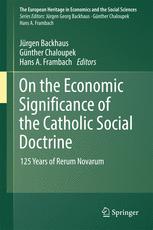

Most ebook files are in PDF format, so you can easily read them using various software such as Foxit Reader or directly on the Google Chrome browser.
Some ebook files are released by publishers in other formats such as .awz, .mobi, .epub, .fb2, etc. You may need to install specific software to read these formats on mobile/PC, such as Calibre.
Please read the tutorial at this link: https://ebookbell.com/faq
We offer FREE conversion to the popular formats you request; however, this may take some time. Therefore, right after payment, please email us, and we will try to provide the service as quickly as possible.
For some exceptional file formats or broken links (if any), please refrain from opening any disputes. Instead, email us first, and we will try to assist within a maximum of 6 hours.
EbookBell Team

4.3
8 reviewsThis book discusses the history and socioeconomic impact of Rerum novarum, the first Catholic social encyclical. Drawn from research presented at the 2016 Heilbronn Symposia on Economics and the Social Sciences, this book resumes the discussion on the origin, dissemination and impact of the Catholic social doctrine which originated in this epoch-making encyclical, arguing that the fundamental concepts of this doctrine have had long-standing influence on the development of the modern social state and social market economy. Beginning with an introductory background on the Rerum novarum, the book moves through chapters focused on the implementation and application of the doctrine throughout its history and the impact it has had on global economics. The book starts with the contributions of precursors and pioneers of the doctrine such as Bishop Wilhelm von Ketteler , proceeds to the reception of Rerum novarum after its implementation, and presents examples of its application. It then moves to the central question of Rerum novarum on the role of land, the taxation of immovable property, and more generally, justice. The book concludes with comments on the wider significance of Rerum novarum and Catholic social doctrine from a sociological and theological perspective. This book will be useful for academic researchers interested in theoretical economic history, political science and history, economic thought, as well as contemporary global and social issues from the perspective of the Christian faith.